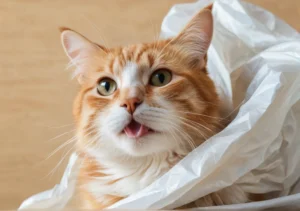Cats can be quirky little creatures, each with their own peculiar habits. One of the most puzzling behaviors is when they munch on rocks.
Many cats eat rocks due to boredom, stress, or nutritional deficiencies, but it can also stem from behavioral issues or curiosity.
Why Do Cats Eat Rocks
Cats aren’t exactly known for having a rock-solid diet, so it can be alarming when your feline friend takes a liking to pebbles and stones. A few different factors might be at play here.
One possibility is pica, a condition that leads cats to chew on non-food items. This behavior can stem from nutritional deficiencies, like a lack of minerals such as iron or zinc. Ensuring your cat’s diet is well-balanced and enriched with essential nutrients might help curb this habit.
Another angle to consider is environmental curiosity. Cats are natural explorers, and sometimes that means investigating everything in their environment—even if it’s not edible. This curious nature can lead them to chew on rocks out of boredom or simply because they find the texture intriguing.
Some cats may also indulge in this behavior due to stress or anxiety. Just like humans might bite their nails when nervous, your cat might turn to rocks as a coping mechanism. If there’s anything in their environment that stresses them out—like changes in the household or loud noises—it’s worth addressing the source of that stress.
Lastly, health issues like dental problems can cause a cat to seek out unusual items to chew on. If your kitty seems overly focused on rocks, a vet visit is a good idea to rule out any underlying health concerns.
Is My Cat Bored
Boredom can drive a cat to explore unconventional snacking options, like rocks, as a way to entertain themselves. When a cat isn’t mentally or physically stimulated, they may start searching for something to engage their natural instincts.
So, how do you recognize if boredom is your cat’s issue? Here are some signs that may help:
Destructive behavior : Scratching furniture or knocking things over? That’s a red flag.
Excessive meowing : If your cat suddenly becomes chatty and clingy, it might be a plea for more interaction.
Playing with strange objects : Like rocks? Yes, that could signal boredom.
To combat boredom and provide more mental enrichment, consider these strategies:
Interactive toys : Puzzle feeders or toys that require your cat to solve a problem can keep them entertained for hours.
Regular playtime : Schedule daily play sessions with wand toys or laser pointers to satisfy their hunting instincts.
Explore new environments : If safe, let your cat roam outside on a leash or provide a window perch to watch birds and squirrels.
Introduce puzzle games : Hide treats around the house or use treat-dispensing toys to encourage exploration.
Rotate toys regularly : Keep their interest by swapping out toys occasionally to keep things fresh and exciting.
Bonus tip : Introduce interactive cat apps on a tablet—many cats love chasing digital mice and fish!
For more on keeping your cat entertained, check out The Humane Society. It’s a treasure trove of ideas!
Can Stress Cause This Behavior
Cats are sensitive creatures, and unexpected anxiety or stress can lead to unusual behaviors like eating rocks. Changes in their environment—like moving to a new home, introducing a new pet, or even a loud construction noise next door—can spike a cat’s stress levels. When they feel overwhelmed, some cats might turn to pica, a condition that drives them to chew or eat non-food items.
Stress-related behaviors in cats often include excessive grooming, hiding, and yes, eating odd substances. If your cat seems more anxious lately, observe their environment and try to identify any changes that might be causing distress.
Signs of stress in cats:
– Increased vocalization
– Hiding or avoiding social interaction
– Changes in eating habits
If the rock munching continues, consider creating a calmer home environment. You can use pheromone diffusers or engage in more playtime. If things don’t improve, reaching out to your vet for guidance might be a smart move.
Are There Nutritional Deficiencies
Cats need a balanced diet to thrive. Sometimes, if they’re not getting the key nutrients they need, they might start munching on rocks to fill that gap. Missing essential amino acids, minerals, or vitamins can trigger this curious eating habit.
Pay attention to their diet: is it high-quality cat food that meets all their nutritional needs? Often, low-quality brands don’t provide the complete nutrition cats require. It’s not just about filling their bellies; the right nutrients support overall health, helping avoid behavioral hiccups.
Nutritional deficiencies that might lead to rock eating:
– Calcium: Essential for strong bones and teeth.
– Iron: Important for proper blood function.
– Fiber: Keeps the digestive system running smoothly.
Think about supplementing their diet or switching brands if you’re worried about deficiencies. Also, don’t hesitate to consult your vet if you suspect something’s off with their nutrition. Regular check-ups can ensure they’re getting everything they need to stay healthy and happy. For more detailed guidance on cat nutrition, you can check out the Association of American Feed Control Officials (AAFCO) here.
Remember, keeping your cat’s diet balanced is key to preventing unusual eating behaviors.
What Role Does Curiosity Play
Cats have a knack for curiosity, giving them a reputation as some of the most exploratory pets. Their instinctive nature drives them to investigate their environment, which often includes poking around and tasting various things—rocks being a common target. This behavior springs from their wild ancestors, who had to investigate and learn about their surroundings for both safety and survival.
When your cat finds a rock, they might be intrigued by its texture or smell. It’s not unusual for a cat to swipe a rock with their paw, sniff it, and even take a nibble. For some cats, it’s all about the thrill of the hunt or the urge to engage their senses. Cats explore the world through taste, so if it fits in their mouth, there’s a good chance they’ll give it a try.
Environmental factors also play a significant role. If a cat’s indoors and lacks sufficient stimulation, they might turn to more unconventional objects like rocks to keep entertained. This behavior could also lead to the occasional play session, where that rock takes on a whole new persona in the cat’s imagination.
If your cat’s showing this behavior, consider enriching their environment with various toys or interactive playtime.
Is It a Behavioral Issue
Engaging with rocks isn’t always innocent curiosity; it could point to deeper behavioral problems. Sometimes, cats can develop compulsive behaviors, leading to obsessive tendencies, which may manifest in eating non-food items, a condition known as pica. Understanding the root of this behavior often requires observing your cat’s overall wellness and environment.
Here’s what to take note of:
- Stress Factors: Changes in the home environment, like moving or introducing new pets, can drive stress that leads to compulsive behavior.
- Nutritional Deficiencies: Sometimes a lack of certain nutrients can lead cats to crave non-digestible items. It’s crucial to ensure they’re getting a balanced diet.
- Dental Issues: If a cat has dental pain, they might chew on non-food items as a way to soothe their discomfort.
- Boredom: Under-stimulated cats are more likely to engage in strange habits. Providing toys, scratching posts, and climbing surfaces can help.
If your cat’s eating rocks consistently, it might be time for a vet visit to rule out any health issues or behavioral disorders. A professional can help pinpoint whether it’s mainly an emotional issue or a sign of something more serious.
For further insights on pica in pets, you can refer to the ASPCA’s resource on pet behavior.
How to Discourage This Behavior
If your cat’s munching on rocks, it’s time to take action. Cats may chew on stones due to boredom, curiosity, or a nutritional deficiency, but letting this continue can lead to serious health risks like gastrointestinal blockage. Here are a few effective strategies to consider:
Provide Alternatives : Offer chew toys designed specifically for cats. These can keep their jaws busy and satisfy their need to gnaw.
Enrich the Environment : Cats thrive on stimulation. Create spaces for climbing, hiding, and exploring with scratching posts, climbing trees, or interactive toys to keep them engaged.
Monitor Playtime : Increase interactive play sessions with your cat using feathers, laser pointers, or soft balls. A tired cat is less likely to seek out rocks for entertainment.
Change the Diet : Sometimes, rock-eating can indicate a lack of certain nutrients. Consult your vet about the best diet for your cat, and consider adding supplements if needed.
Create Boundaries : If there are areas where rocks are accessible, consider blocking these places off or relocating any ornamental stones in your garden.
Identify Triggers : Keep an eye on when your cat tends to eat rocks. Is it during certain times of the day or after being left alone for a while? Knowing the patterns can help you address the root cause.
Lastly, never underestimate the power of observation. Noticing your cat’s habits can offer insights into why they might feel compelled to chew on rocks.
When Should You See a Vet
Eating non-food items, like rocks, can sometimes lead to serious issues. If your cat is consuming stones, it’s crucial to recognize the signs that warrant a trip to the vet. Here’s what to watch out for:
Vomiting or Regurgitation : If your cat is throwing up, especially if there’s a foreign object involved, it’s time to consult a professional.
Change in Appetite : A sudden loss of interest in food might indicate a problem in their digestive tract.
Lethargy or Discomfort : If your cat seems unusually tired or is hiding more than usual, these can be signs of underlying health issues.
Abdominal Pain or Swelling : Any indication that your cat is in pain, like an unusual posture or vocalizations, could suggest an obstruction caused by ingested rocks.
Behavior Changes : Increased anxiety, attempts to escape, or changes in litter box habits may also be signs of distress related to rock consumption.
An excellent resource for understanding the implications of pica in pets can be found at the ASPCA. Addressing these behaviors quickly can help prevent long-term health consequences.
Interesting Facts About Cats
Cats can be quirky creatures, and their eating habits often leave us scratching our heads. If you’ve noticed your feline friend munching on rocks, you’re not alone. This behavior, while puzzling, can stem from several underlying causes and interesting facts about their nature.
One possibility is Pica, a condition where pets crave non-food items. It can point to nutritional deficiencies, boredom, or stress. If your cat’s diet lacks certain minerals, they might seek out rocks to compensate.
Additionally, some cats are just natural explorers. Those curious whiskers lead them to all sorts of textures, and sometimes, that means sampling the ground beneath them. This doesn’t always indicate a serious issue—cats have a playful side too!
Here’s a quick rundown of factors that might contribute to your cat’s rock-eating habits:
- Nutritional Deficiencies: Lacking essential nutrients can lead cats to consume unusual items.
- Curiosity: Cats are inquisitive by nature and often explore their world with their mouths.
- Stress or Anxiety: Sometimes, changes in environment or routine can prompt odd behaviors.
- Boredom: Without enough stimulation, a cat might resort to unusual chewing habits.
If this behavior seems persistent, it’s wise to consult your vet. They can assess whether there’s a medical reason behind it. For more comprehensive insights about cat nutrition, check out the expert advice from the American Association of Feline Practitioners here.
Understanding your cat’s behavior is essential for their well-being, and being observant can help keep them healthy and happy.
Alex, a passionate animal lover, has experience in training and understanding animal behavior. As a proud pet parent to two dogs and three cats, he founded AnimalReport.net to share insights from animal experts and expand his knowledge of the animal kingdom.




